|
|
|
Sort Order |
|
|
|
Items / Page
|
|
|
|
|
|
|
| Srl | Item |
| 1 |
ID:
155156
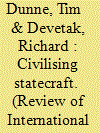

|
|
|
|
|
| Summary/Abstract |
In this contribution to the forum marking the publication of Andrew Linklater’s remarkable book on Violence and Civilization in the Western States-Systems we first locate the book in the context of Linklater’s overarching intellectual journey. While best known for his contribution to a critical international theory, it is through his engagement with Martin Wight’s comparative sociology of states-systems that Linklater found resonances with the work of process sociologist, Norbert Elias. Integrating Wight’s insights into the states-system with Elias’s insights into civilising processes, Violence and Civilization presents a high-level theoretical synthesis with the aim of historically tracing restraints on violence. The article identifies a tension between the cosmopolitan philosophical history which underpins the argument of the book, and which has underpinned all Linklater’s previous works, and the ‘Utrecht Enlightenment’ that offers a conception of ‘civilized statecraft’ at odds with a universal conception of morality and justice. The article then examines Linklater’s argument about the ‘global civilizing process’ as it applies to post-Second World War efforts to build greater institutional capability to protect peoples from harm. It is argued that Linklater over-estimates the extent to which solidarism has civilised international society, and that the extension of state responsibilities and development of civilised statecraft owe more to pluralism than solidarism.
|
|
|
|
|
|
|
|
|
|
|
|
|
|
|
|
| 2 |
ID:
141222
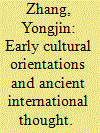

|
|
|
|
|
| Summary/Abstract |
A short commentary on Martin Wight’s ‘The Disunity of Mankind’, a short and unfinished piece in which Wight focuses almost exclusively on the Western tradition of thought, from Plato and Aristotle, to the Stoics and to Augustine.
|
|
|
|
|
|
|
|
|
|
|
|
|
|
|
|
| 3 |
ID:
155791
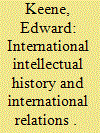

|
|
|
|
|
| Summary/Abstract |
This article reviews contextualist methods in intellectual history and discusses some of the specific challenges involved in their application to the study of International Relations (IR) and hence international intellectual history. While the broad thrust of these developments has been highly positive, the article argues that a distinction between classic and lesser works is a crucial part of the apparatus of the contextualist approach, which poses a problem in IR, where the idea of an established canon of great works has historically been less well developed than in the study of Political Theory or Law. As a result, the move towards contextualist methods of interpretation can force authors to restrict their focus onto a newly conceived, and somewhat narrow, canon, with a strongly political and legal flavour. The eclectic range of earlier, albeit less methodologically sophisticated, histories offer considerable resources for defining the scope of new empirical enquiries in international intellectual history, and the article concentrates on early modern journalism as an example of this opportunity.
|
|
|
|
|
|
|
|
|
|
|
|
|
|
|
|
| 4 |
ID:
141220
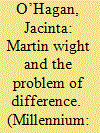

|
|
|
|
|
| Summary/Abstract |
In the ‘Disunity of Mankind’, Martin Wight addresses a recurrent dilemma in Western thought: how do we reconcile conceptions of human community with those of human diversity? The ways in which diversity is understood and the meanings attached to difference has significant implications for political orders and human interaction. The deployment of difference can generate both sites of contest, and the permissive conditions for particular forms of political action. Wight’s dilemma remains highly salient today. We continue to struggle intellectually, ethically and politically to reconcile claims of a universal human community with the plurality of human societies. Whilst we ostensibly value diversity, we still persistently constitute difference through producing dichotomies that generate both moral and political hierarchies and boundaries, which in turn form significant features in the landscape of contemporary world politics.
|
|
|
|
|
|
|
|
|
|
|
|
|
|
|
|
| 5 |
ID:
132915
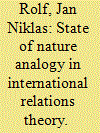

|
|
|
|
|
| Publication |
2014.
|
| Summary/Abstract |
Today, the domestic analogy is a well-established and frequently used term in the discipline of International Relations (IR). What is less established is that often two different analogies are hiding behind this term - an analogy between the domestic and the international realm, on the one hand, and an analogy between a state of nature and the international realm, on the other hand. This article argues that only in the former case, we can speak of domestic analogy. In the latter case, the 'state of nature' is mistaken for the 'domestic', which, on closer inspection, are converse terms. After a critique of the way in which the domestic analogy has been used in the literature, and in the work of Chiara Bottici in particular, I develop the alternative concept of the state of nature analogy and locate it within each of Martin Wight's three traditions of international theory. Once we have unraveled the two analogies, the advantages of using the state of nature analogy over the domestic analogy become manifest.
|
|
|
|
|
|
|
|
|
|
|
|
|
|
|
|
| 6 |
ID:
141219
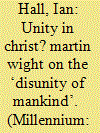

|
|
|
|
|
| Summary/Abstract |
This response to Martin Wight’s ‘Disunity of Mankind’ contextualises the essay in his wider thought and explores the Christian underpinnings of his thinking on cosmopolitanism. It argues that the essay demonstrates both Wight’s strengths – in terms of his forensic analysis of a broad range of Western texts – and his weaknesses, which flowed from his conviction that the Christian tradition, and Western values more broadly, were the best foundation for international society.
|
|
|
|
|
|
|
|
|
|
|
|
|
|
|
|
| 7 |
ID:
155155
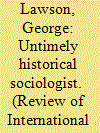

|
|
|
|
|
| Summary/Abstract |
This article examines the historical sociology that informs Andrew Linklater’s Violence and Civilization in the Western States-Systems. On the sociological side, it critically assesses Linklater’s use of Elias and Wight, arguing that his ‘higher level synthesis’ is internally incompatible. On the historical side, the article argues that the occlusion of the transnational interactions that, in great measure, drive historical development means that Linklater’s analysis is inadequate for its stated purpose: to chart the development of civilising processes within the Western state-systems.
|
|
|
|
|
|
|
|
|
|
|
|
|
|
|
|
|
|
|
|
|